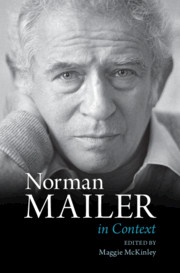Book contents
- Norman Mailer in Context
- Norman Mailer in Context
- Copyright page
- Contents
- Notes on Contributors
- A Note on References and Abbreviations
- Introduction
- Part I Literary Influences
- Part II Form and Genre
- Part III Political Contexts
- Part IV Philosophical and Cultural Contexts
- Chapter 16 Totalitarianism
- Chapter 17 The Hipster
- Chapter 18 Existentialism and Manichaeism
- Chapter 19 Technology
- Chapter 20 Violence
- Chapter 21 Race
- Chapter 22 Judaism
- Part V Gender and Sexuality
- Part VI Profiles and Literary Biographies
- Part VII Mailer’s Legacy
- Primary Bibliography
- Selected Secondary Bibliography
- Index
Chapter 22 - Judaism
from Part IV - Philosophical and Cultural Contexts
Published online by Cambridge University Press: 05 August 2021
- Norman Mailer in Context
- Norman Mailer in Context
- Copyright page
- Contents
- Notes on Contributors
- A Note on References and Abbreviations
- Introduction
- Part I Literary Influences
- Part II Form and Genre
- Part III Political Contexts
- Part IV Philosophical and Cultural Contexts
- Chapter 16 Totalitarianism
- Chapter 17 The Hipster
- Chapter 18 Existentialism and Manichaeism
- Chapter 19 Technology
- Chapter 20 Violence
- Chapter 21 Race
- Chapter 22 Judaism
- Part V Gender and Sexuality
- Part VI Profiles and Literary Biographies
- Part VII Mailer’s Legacy
- Primary Bibliography
- Selected Secondary Bibliography
- Index
Summary
Shortly before his death in 2007, in an interview for Nextbook Reader, Mailer was asked what role Judaism had played in his body of work. His response was “An enormous role.” Raised in a Jewish family, Mailer himself never accepted the traditional Judaism practiced by his parents, and (with the possible exception of The Naked and the Dead), his work does not address the lives of Jewish Americans as explicitly as some contemporary Jewish writers like Saul Bellow or Philip Roth. Yet Mailer himself insisted that the religious and spiritual aspects of Judaism as well as the experience of Jewish identity were central to his work, and this chapter provides an overview of those influences, also acknowledging how they factor into his decision to pen novels about both Jesus Christ (The Gospel According to the Son) and Adolf Hitler (The Castle in the Forest).
- Type
- Chapter
- Information
- Norman Mailer in Context , pp. 246 - 256Publisher: Cambridge University PressPrint publication year: 2021

